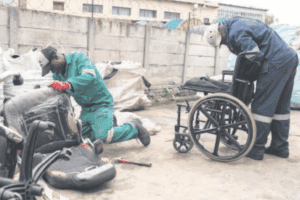Our car's battery is something we pay little attention to these days, until it lets us down.

Modern lead-acid batteries are a far cry from the leakey attention craving units of years ago. Modern construction techniques have largely eliminated the need for topping up and cleaning or charging.
When we go to replace the battery we are usually given a price for a new battery that is dependent on us providing the supplier with the old battery, usually the difference is about R150.
Why this is so and what is done with the old battery has never been that clear and it often appears the supplier is none too sure either. “They come and collect them” is about as much of an explanation as I have ever received.
A visit to First National Battery in Benoni enlightened me. First National Battery make a vast number of batteries for a wide array of applications, from backups for telephone networks to underground locomotive batteries and just about everything inbetween.
As motorists we would recognise their Raylite brand supplied through Battery Centre most easily. However, when it comes to that old battery that just left you stuck at the supermarket in the rain, it doesnt really matter who made it; as once they are all used up car batteries are all valuable for more or less the same thing – lead. In fact the lead is vital to local manufacturers as lead is not mined in South Africa and imports of new lead are extremely expensive.
Surprisingly the fundamentals of the car battery have changed little over many years. Lead plates are separated by insulating plates and immersed in an acidic solution referred to as electrolyte. The sophistication of the structure has changed over the years, but not the basic principle, car batteries require large quantities of lead in their construction.
This poses two potential problems – lead is both expensive and highly toxic. Fortunately, the former provides the solution to the latter and that it were your old battery gets its “trade-in” value.
But it is how First National Battery unlocks this value that is so fascinating. Suppliers have been taking back old batteries for a small sum for ages, but First National Battery have turned it into a vital part of their business – recycling more than 90% of their scrap into brand new batteries. The batteries are not reconditioned, they are completely destroyed and the components used to build new units. The only part of the battery that does not become part of a new car battery, is the paper thin plate separators and the electrolyte itself.
Old batteries are smashed apart in a machine called a battery breaker which separates the lead plastic and acid, crudely speaking, by utilising their different properties. Lead obviously floats and plastic sinks. In reality the process is quite sophisticated and almost all of these two materials is recovered. The plastic shards are pelletised and shipped off to the company’s Fort Jackson plant where the pellets are used to build new battery cases and caps.
The lead is then melted in a rotary furnace cast into ingots, and then analysed in a spectrometer. The lead is then blended to transform it into the specific alloy required and shipped off to East London. There the First National Battery plant uses it to make new batteries. The process is so efficient that First National Battery has launched an initiative to recover old batteries that are not returned via the dealership network. In taking as many scrap batteries from as many sources as possible they are fullfilling a vital environmental function. The effect of tons and tons of toxic lead, plastic and electrolyte being simply dumped would be substantial. The recycling process is extremely carefully monitored, and even the smoke from the smelters is filtered to ensure there is an absolute minimum of toxic effluent.
If you have scrap batteries you would like to dispose of, First National Battery can probably help. Contact Brian Cooper on the toll free 0800 333 462, or email him on [email protected].
Support Local Journalism
Add The Citizen as a Preferred Source on Google and follow us on Google News to see more of our trusted reporting in Google News and Top Stories.








